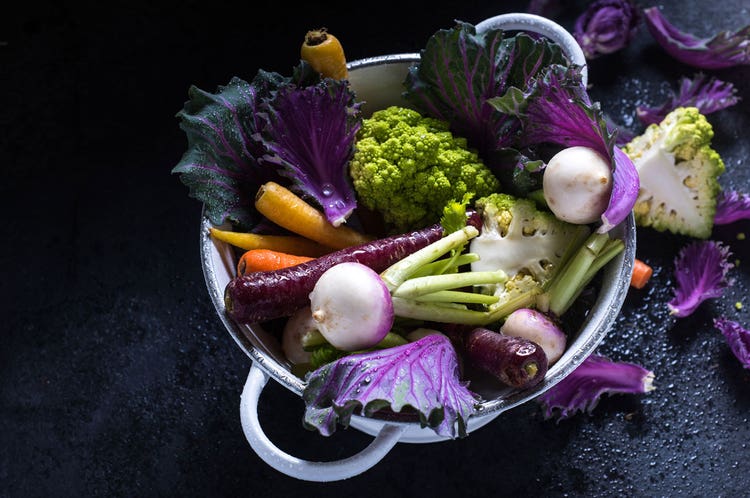Crack the Diet Code

Choose a healthy eating plan for life.
From Atkins to the personality type diet to the Zone, it seems as though a diet exists for every letter of the alphabet. When you’re inspired and motivated to eat healthy (and perhaps lose some weight), the glut of options makes choosing a plan an overwhelming and confusing task. The good news is that you don’t have to choose. It turns out, the most effective ones are actually quite similar in principle.
According to Dr. David Katz, director of Yale University’s Prevention Research Center, the best diets are those that limit refined starches, added sugars, processed foods and certain fats, while emphasizing whole-plant foods. Dr. Mike Roizen, chief wellness officer and Wellness Institute chair at Cleveland Clinic, tells his patients to also eschew saturated and trans fats.
In place of these less healthy foods, cram your meals with whole, natural, unprocessed options. In his book “In Defense of Food: An Eater’s Manifesto,” Michael Pollan famously advises, “Eat food. Not too much. Mostly plants.” Pollan also suggests, “Don’t eat anything your great-grandmother wouldn’t recognize as food.”
“Everyone can start with this,” says Dr. Mark Hyman, medical director at Cleveland Clinic’s Center for Functional Medicine. “Eat real food. You don’t need a prescription from a doctor to do that. I say, eat the food that God made, and leave the food that man made.”
The plans experts prefer
If these guidelines aren’t enough and you’d rather follow a specific plan, there’s a handy compilation and ranking of diets from U.S. News & World Report. The publication’s editors and reporters created its seventh annual rankings by reviewing diets and scouring medical journals, government reports and other resources to produce the final list. Katz, who served as one of the judges, tends to support traditional Mediterranean, vegetarian, vegan, Asian, and flexitarian eating patterns.
Roizen encourages his patients to consider the Mediterranean diet; Esselstyn’s “Preventative and Reverse Heart Disease” diet; and his own diet, which he and co-author Dr. Mehmet Oz detail in their book “You On a Diet: The Owner’s Manual for Waist Management.”
Meanwhile, Hyman gravitates toward a paleo-vegan lifestyle with “real, whole, fresh, sustainably raised food.” In general, he believes in eating mostly plants and a lot of healthful proteins and fats (such as nuts, seeds, avocadoes, sardines and olive oil). He also advises limiting gluten-free whole grains and avoiding dairy and gluten.
Finding the plan that’s right for you
With medical experts’ general rules in mind, you can take an honest look at yourself to choose a plan that’s right for you. Take these factors into account:
- Health issues. Assess whether you have any specific health issues, such as diabetes, cancer or high blood pressure. Are you allergic to any foods or lactose intolerant? These factors will likely affect which foods you cut out or consume.
- Your needs and preferences. Next, think about how much time you have to shop and cook, what you feel comfortable preparing, and which (nutritious) foods you love. Devise meals and shopping strategies that suit your needs and preferences. If you’re time strapped, have groceries or meals delivered. If you’re a cooking novice, take a healthy cooking class.
- Simplicity. Or just keep meals very simple. For instance, preheat your oven to 400 F. Marinate a boneless, skinless chicken breast in balsamic vinegar, a bit of Dijon mustard, a pinch of salt and pepper, and a little extra virgin olive oil for a few minutes. Transfer to one half of a greased baking sheet. In a small bowl, toss store-bought broccoli florets with a bit of salt, pepper and olive oil. Transfer to the other half of the baking sheet. Roast, turning over once, until the chicken is cooked through and the broccoli is tender and slightly golden brown. For dessert, toss diced apple with a bit of lemon juice in a small bowl and top with toasted walnuts.
- Automation. To encourage success, build automation into your eating plan. Roizen counsels patients to choose from one of two choices each for breakfast, lunch and snack (and to vary dinner). For example, for breakfast, he’ll opt for oatmeal with nuts and berries or an egg-white omelet.
- Support. If you’d like extra support or find this process daunting, work with a trusted doctor, nutritionist or nutrition coach. For instance, according to Roizen, Cleveland Clinic coaches 3,000 people via email each day. Read books by trusted authors, and visit reputable websites, such as www.mayoclinic.com, www.nih.gov, or www.webmd.com.
Overall, make sure that the eating plan you choose is doable—for you. As Katz stresses in Diets on Parade: The Best and Worst of the 2017 Best Diets Report, “In some ways, the ‘best’ [diet] is the one that you will actually do! No matter how good a dietary pattern is, it won’t do you much good if you can’t get yourself to swallow it.”
That’s why you shouldn’t regard your eating plan as a diet. Katz and Roizen agree that “dieting” is a problematic concept, implying something temporary. Instead, maintaining health requires a sustainable way of living and eating. It should be practical, pleasurable and easy enough to maintain.
“This is not a diet but a lifestyle change,” concludes Roizen. “That’s why you’ve got to have food you love.” Sounds like a delicious game plan.
Photo credit: 123RF Stock, merc67